The Kat O fish raft is working towards 100% autonomous operations, making it an ideal experimental paltform for sustainability.
What is the role of the human?
Diving is needed for husbandry, acquiring scientific data, and making careful observations within and among the cultured species. Just as humans stand to gain from IMTA systems, they must also give back to close the loop in human health and well-being.
In 2015, we deployed a Gen II Ocean Space Habitat which is a significant step forward in portable mini-habitat development. It incorporated dedicated life-support systems that made the entire habitat a dependent life system for the diver. This sets the stage for scaling up mission durations to full 24 hour cycles or more in the future, allowing the diving scientist to spend significant amounts of time in the water, while being highly mobile, and providing newly created work space to accomplish previously unachievable tasks.
The purpose of the 2015 Hong Kong deployment was to:
- Continue to evaluate deployment strategies for these types of habitats in extremely remote locations with very little local infrastructure.
- Educate young marine scientists about the creation of novel underwater workspaces, thus inspiring future uses for this technology.
- Foster discussion on the utility value of these structures and the role of the human within the Integrated Multi-Trophic Aquaculture model in place at the Kat O Research Fish Raft in Hong Kong, and beyond.
Statistics show 99% of marine derived natural products for fighting cancer and other human disease fall short of making it to the market because their supply is limited. As a component of IMTA research, establishing resupply of both commercial fisheries and biologics for human health could prove life saving.
Portable habitats as an element of the IMTA platform could open a new realm of underwater research by providing functional space within the environment to carry out research tasks before returning to the surface. This type of space can be used to culture novel biologics, establish experimental bioreactors, and afford long term in situ observation for the diving scientist.
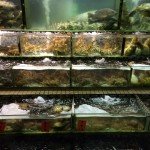 Seafood markets on the streets of Hong Kong meet everyone's tastes - from customary staples to the more exotic, and whether the products of sustainable fisheries, or not.
Seafood markets on the streets of Hong Kong meet everyone's tastes - from customary staples to the more exotic, and whether the products of sustainable fisheries, or not.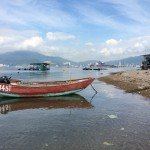 Kat O is an old fishing village resting at the doorstep of the very modern shipping port of Shenzen (background).
Kat O is an old fishing village resting at the doorstep of the very modern shipping port of Shenzen (background).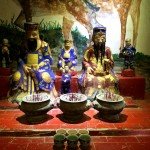 Kat O's Tin Hau temple provides wellness for seafarers and fisherman.
Kat O's Tin Hau temple provides wellness for seafarers and fisherman.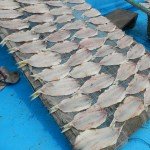 Old world fishing practices are the norm at the Kat O Island fishing village located in Hong Kong's North District.
Old world fishing practices are the norm at the Kat O Island fishing village located in Hong Kong's North District.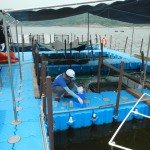 City University of Hong Kong's modern fish raft for Integrated Multi-Trophic Aquaculture (IMTA) research seeks to solve many problems with sustainable seafood and other marine natural products by developing integrating forward-looking aquaculture technology and practices.
City University of Hong Kong's modern fish raft for Integrated Multi-Trophic Aquaculture (IMTA) research seeks to solve many problems with sustainable seafood and other marine natural products by developing integrating forward-looking aquaculture technology and practices. The Gen II habitat includes dedicated life support, providing a step towards becoming a dependent system for long underwater stays at very remote locations.
The Gen II habitat includes dedicated life support, providing a step towards becoming a dependent system for long underwater stays at very remote locations.